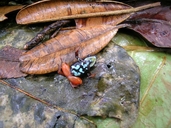|
Description
The smallest known Mantella, M 19 mm, F 19-22 mm. Head and dorsum dark grey or brown, sometimes with a fine mid-dorsal line. Flanks black. No frenal stripe. Upper forelimb yellowish, upper hindlimb bright yellow, lower arms and legs brown. Upper part of iris with light pigment. Venter black with few large, irregular, blue markings. Throat with distinct horseshoe-marking. Ventral surface of legs orange.
Similar species: M. haraldmeieri is larger and has no horseshoe marking on the throat.
Distribution and Habitat
Country distribution from AmphibiaWeb's database: Madagascar
Mangevo (Ranomafana), Manombo, near Tolongoina, Vevembe, and some additional unnamed localities. It occurs between 60-629m asl in degraded rainforest, including very tiny patches. It is not found in open areas or littoral forest on a sandy substrate (Cadle and Raxworthy 2008).
Life History, Abundance, Activity, and Special Behaviors
Habits: Known from several, often fragmented low-altitude rainforest areas, sometimes associated with swamps. Active during the day on the ground.
Calls: A short trill, different from other Mantella calls, and reminding a cricket. One single note that is a short trill consisting of 2-8 clicks. Click duration 11-19 ms, duration of intervals 8-15 ms. Frequency is between 4.8 and 5.7 kHz. Calls are repeated after irregular intervals.
Eggs and tadpoles: Unknown.
Trends and Threats
Endangered: area of occupancy is probably less than 500km2, its distribution is severely fragmented, and the extent of its forest habitat in east-central Madagascar is declining, and the number of mature individuals might also be declining through over-exploitation. It is found in the Manombo Special Reserve and Parc National de Ranomafana. There is a need for trade in this species to be carefully regulated (Cadle and Raxworthy 2008). Possible reasons for amphibian decline General habitat alteration and loss
Habitat modification from deforestation, or logging related activities
Intensified agriculture or grazing
Habitat fragmentation
Intentional mortality (over-harvesting, pet trade or collecting)
Comments
Taken with permission from Glaw and Vences (2007).
References
Cadle, J. and Raxworthy, C. (2008). Mantella bernhardi. In: IUCN 2008. 2008 IUCN Red List of Threatened Species. www.iucnredlist.org. Downloaded on 22 April 2009.
Glaw, F., and Vences, M. (2007). Field Guide to the Amphibians and Reptiles of Madagascar. Third Edition. Vences and Glaw Verlag, Köln.
Originally submitted by: Miguel Vences and Frank Glaw (first posted 2000-12-13)
Edited by: Henry Zhu (2009-05-06)Species Account Citation: AmphibiaWeb 2009 Mantella bernhardi <https://amphibiaweb.org/species/4562> University of California, Berkeley, CA, USA. Accessed Apr 17, 2024.
Feedback or comments about this page.
Citation: AmphibiaWeb. 2024. <https://amphibiaweb.org> University of California, Berkeley, CA, USA. Accessed 17 Apr 2024.
AmphibiaWeb's policy on data use.
|
